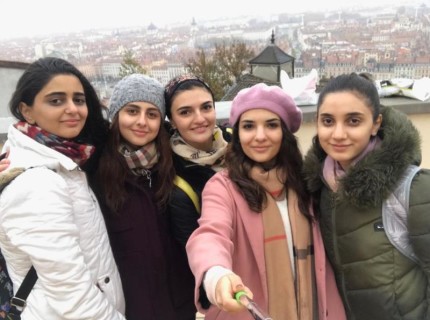“I did not have difficulty at Montpellier as I was studying in English at UNEC”
The project “UNEC to the World” is continuing. This time the interviewer of the project is Masma Abbasova, the student of the International Economics School (ISE) of the UNEC. M.Abbasova is continuing her education in France within the framework of dual degree diploma program of UNEC with Montpellier university.
UNEC NEWS is presenting the interview with Masma Abbasova:
– Masma, what was the nexcessity to join the dual diploma program and what adavantages will it give you?
– The main reason for joining the dual degree diploma program is the chance to get the bachelor’s degree, when I graduate, from not only the UNEC but also the University of Montpellier. Within 4 years, I will gain the diploma from the prestigious university both Azerbaijan and Europe, this is a great advantage for me. I am sure that, in the future I will be able to create the successful career with the knowledge and diplomas gained from both universities.
– What procedures have you gone through to join the dual degree diploma program, have you had any problem?
– No, there was not any problem. The dual degree diploma program of UNEC with the Montpellier university has been continuing for 3 years, even there were the first graduates. That’s why everyone was well-informed. For joining the program I submitted my CV and academic transcript, and then I was invited to the interview stage. After receiving the information that I had successfully interviewed, the meeting was held at the university with the participation of the organizers of the program, parents, as well as, with the students who hasd participated inthe program last year. During the meeting, we had the opportunity to clarify the issues that worried us. Later, I applied for a long-term student visa to the French Embassy, and as in the embasy they had already known the UNEC and us, there was just left behind to gather the required documents.
– What similarities and differences are existing between UNEC and Montpellier University?
– First of all, I would like to say that, the education system in Europe and Azerbaijan is quite different. This difference is felt not only in higher education but also at the secondary school level. The ability to conduct the research, and work with the group are instilled in the students from their school years, but we are transferring to this system newly. Also, the less number of lesson hours, providing more compact lessons, the less number of exams, developing more the research capabilities of students, non-existence of the absences rate system are among the different aspects. Nevertheless, I would not say that the level of education at the UNEC is far behind. I cannot say it for other faculties, but most of the teachers of the International School of Economics where I have been studied, had received their education abroad and teach the classes at a high level. This is one of the factors that directly affects the growth of ISE students as highly competent and experienced professionals.
– What do you like more at Montpellier university?
– I like the fact that the lectooms are more modern, the teachers are more experienced in technology, and conducting classes in the shortened form. There are many subjects we have trained during the semester at the UNEC, we have 2 colloquiums, session exams, individual works, we have prepared for seminars, which, in my opinion, will not play the important role in our future career, and as for me it is loss of time.
– What challenges did you face during your first visit to Montpellier university? How did the environment, the language difference, and the different cultures affect you?
– There was not any difficulty almost from the university and the lesson point of view. As I was taught in English language at the UNEC, the subjects at Montpellier University came to me convenient in language point of view, I did not have any difficulty. Since foreign students are of different ages and nations, it was difficult to communicate with them at first, but while participating in group work, this difficulty gradually disappeared. There are almost the students from every country and every student demonstrates their culture. It is easy to communicate with some, but with some unfortunately not easy. The students communicate with each other more in group work and those who are the same or close to the culture spend their time together after the lesson, as well. As the mjority of the French did not prefer speaking in English, in the early days I had some difficulties,as I did not know the city well and exactly and there were some issues regarding the documents that I had to solve. But soon, I have been accustomed to the new environment.
– Are there any privileges for foreign and local students at Montpellier?
– There are not too much privileges for the students here, but there is a special organization, when applying to this organization the fee paid for dormitory is discounted and the part of the amount is paid to the hostel by that organization.
– How much is a student’s monthly living expenses in France?
– I think, this question varies depending on how the student allocates the budget and for what he spends. The monthly expenses begin to decline over the time. Totally, 30-35 Euros per month from the budget is paid for the shopping to the market, 10-15 Euros for transportation, 162 Euros for the dormitory rent.
– How do you spend your leisure time?
– Taking advantage of this opportunity, I try to walk in Montpellier and visit other cities of Europe and I find the features of every city that amaze me.
– How do you represent our country abroad as the Azerbaijani student?
– Since there is a student from every country in the group, teachers frequently ask questions about the culture and lifestyle of that country. I try to answer the questions in the fullest possible way and represent my country in a better way.
– 10 UNEC students currently are studying at the Montpellier University. How is your relationship, do you supprt each other at the lessons?
– We – 5 girls are staying in the same hostel. From the first day we come here, we help each other both at the lessons and out of the classes. We are together with other students at the lessons, as well, and we try to support each other as much as we can, especially during the exams. We also get the information from the Azerbaijani students who came here last year, they share their experience with us, as well.
– How do you take your exams, is not it difficult?
– The Examination System at the Montpellier University is completely different. Our exams have started in October-November months. Unlike the UNEC, there are fewer lessons and fewer topics. 15 hours are taken to study each lesson and it finishes in short period of time. The examinations are provided in the written form and the questions are not given to students in advance. The maximum score is 20 points for each subject. Some teachers give grades based on the group work and exams, and some give grades only for the written test. We took our last examination in the second half of December. We are now starting to set up holiday plans.
I am very glad that the exams are over, but I’m disappointed that my time to be held here is running out. For me, Montpellier has become a great experience. I met new friends here, I lived a true student life. I have had the opportunity to take lessons from teachers from different nationalities and to get education in the same group with the students from different nationalities, as well. I am very grateful to my parents and UNEC for creating this condition!


